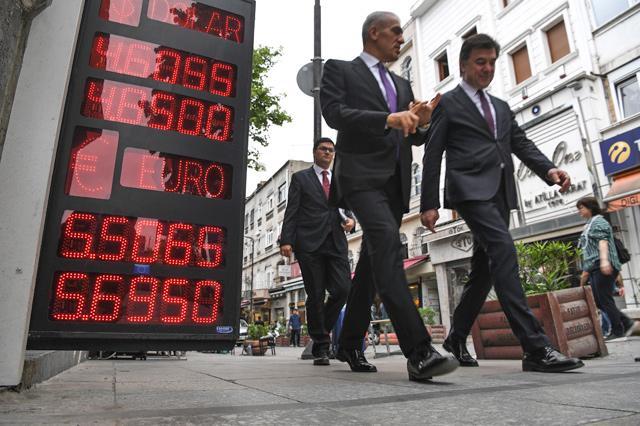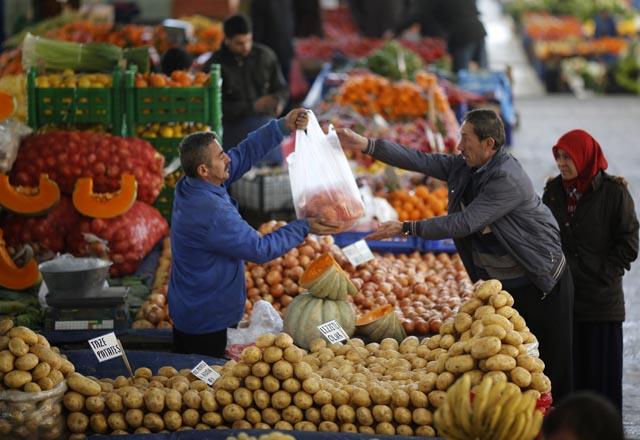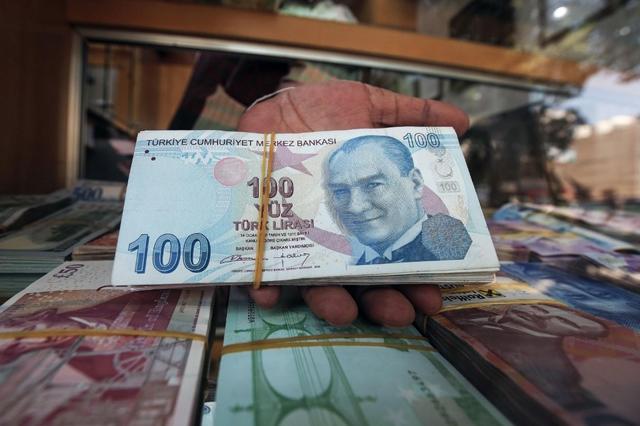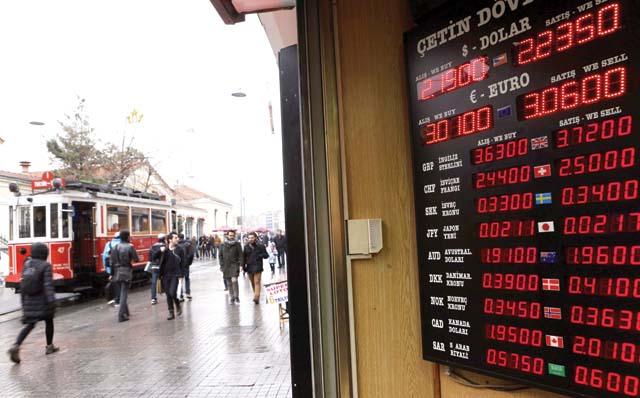You are here
Turkey’s lira rallies after emergency rate hike
By AFP - May 23,2018 - Last updated at May 23,2018

People pass next to a board displaying US dollars and Euros exchange rates in Turkish liras in Istanbul on Wednesday (AFP photo)
ISTANBUL — Turkey’s central bank on Wednesday announced a sharp hike in interest rates to boost the embattled lira, prompting the currency to rally strongly after haemorrhaging value against the dollar in the last days just ahead of elections.
The bank said after an emergency meeting of its monetary policy committee it was raising the late liquidity window lending rate from 13.5 per cent to 16.5 per cent.
The lira had earlier lost over 3.5 per cent in value against the dollar but sharply gained in value after the bank’s announcement, gaining 1.1 per cent in value on the day to trade at 4.62 lira to the dollar.
“Current elevated levels of inflation and inflation expectations continue to pose risks on pricing behaviour,” the bank said in a statement.
“Accordingly, the committee decided to implement a strong monetary tightening to support price stability,” it added.
Turkish inflation reached 10.85 per cent in April from the same month the year earlier and the economy has been plagued by fears of overheating despite impressive growth.
The central bank’s statement ended days of suspense on the markets over whether it would implement a rate hike after President Recep Tayyip Erdogan pressed for lower rates to boost growth.
The next scheduled meeting of Turkey’s central bank had not been due until June 7 but economists had said an emergency — and substantial — rate hike by the central bank is not only on the cards, but essential.
‘Maintain tight stance’
The 300 basis points hike was largely in line with what economists said was needed and, in a hawkish statement, the central bank said it would continue to use “all instruments” to achieve price stability.
“A tight stance in monetary policy will be maintained decisively until the inflation outlook displays a significant improvement,” it added.
The sharp fall in the currency’s value has come at a hugely sensitive time as Turkey heads to June 24 presidential and parliamentary elections where Erdogan is seeking a new mandate and a thumping parliamentary majority.
Until the bank’s move, the lira has lost over 18 per cent in value against the dollar as fears grow over the health of the Turkish economy.
Its performance has been even worse than the Argentinian peso which has also suffered severe turbulence over the last month.
“The decision will ease investors’ fears that the central bank is unwilling or unable to tighten policy ahead of elections scheduled for June,” said Jason Tuvey, emerging markets economist at London-based Capital Economics.
The situation had not been helped by Erdogan himself who has consistently pressured the central bank to keep rates down to boost growth.
He hurt the lira last week by saying he plans a greater say in monetary policy if he wins the elections, which markets saw as a slap in the face of the nominally independent central bank.
He has also made statements that fly in the face of economic orthodoxy, describing interest rates as the “mother and father of all evil” and saying low interest rates help keep down inflation.
‘Short-lived relief?’
The Istanbul bourse earlier said it was taking measures to convert its foreign exchange assets to lira to “fight speculative actions aimed at creating a negative image of Turkey”, but it was unclear if this would have any impact on the currency.
An AFP photographer in Istanbul’s Grand Bazaar said currency traders were refusing to sell dollars to limit their own losses amid the currency slide.
The economy has generally been a trump card for Erdogan in his 15 years in power, with the Turkish strongman crediting himself with ending chaos that brought the country to near financial meltdown in the 2000-2001 crisis.
Tuvey said investors will still be waiting to see signs that Turkey is serious about tackling its high inflation and high current account deficit, and not loosen fiscal policy ahead of the election.
“The central bank has hiked interest rates several times over the past few years to shore up the currency. But the relief has often proved short-lived,” he said.
Related Articles
Standard & Poor’s (S&P) cut its outlook on Turkey’s ratings to negative from stable on Friday, saying that it saw risks of a hard economic landing and that the country’s policy environment was becoming less predictable.
ISTANBUL — The Turkish lira sank to a record low against the dollar on Thursday after the central bank slashed interest rates for the third
A massive rate hike may have stalled the Turkish lira’s fall and salvaged the central bank’s credibility, but it stunts growth at a politically fraught time for Prime Minister Recep Tayyip Erdogan and may not shield Turkey from a fragile global backdrop for long.



















